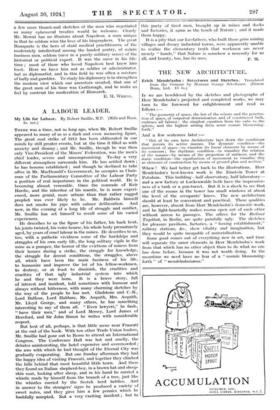A LABOUR LEADER.
THERE was a time, not so long ago, when Mr. Robert Smillie appeared to many of us as a dark and even menacing figure, The great coal strike of 1912 has been obliterated in our minds by still greater events, but at the time it filled us with anxiety and dismay ; and Mr. Smillie, though he was then only Vice-President of the Miners' Federation, was the men's chief leader, severe and uncompromising. To-day a very different atmosphere surrounds him. He has settled down ; he has become established ; and though he declined to take office in Mr. MacDonald's Government, he occupies as Chair- man of the Parliamentary Committee of the Labour Party a position of real importance in the political world. He is becoming almost venerable. Once the comrade of Keir Hardie, and the inheritor of his mantle, he is more experi- enced, more genial, more urbane than that rather rugged prophet was ever likely to be. Mr. Baldwin himself does not smoke his pipe with calmer deliberation. And now, in the evening of a long life of struggle and conflict, Mr. Smillie has set himself to recall some of his varied experiences.
He describes to us the figure of his father, his back bent, his joints twisted, his voice hoarse, his whole body prematurely aged, by years of cruel labour in the mines. He describes to us, too, with a pathetic vividness some of the hardships and struggles of his own early life, the long solitary vigils in the mine as a pumper, the horror of the evictions of miners from their houses during a strike, the struggle for knowledge, the struggle for decent conditions, the struggles, above all, which have been the main business of his life, to humanize and improve the lot of his fellow-workmen, to destroy, or at least to diminish, the crudities and cruelties of that ugly industrial system into which he and they were born. It is a brave story, full of interest and incident, told sometimes with humour and always without bitterness, with many charming sketches by the way of the people he has met. Gladstone and C.-B., Lord Balfour, Lord Haldane, Mr. Asquith, Mrs. Asquith, Mr. Lloyd George, and many others, he has something interesting to say of them all. "Even lawyers," he finds, "have their uses," and of Lord Mersey, Lord James of Hereford, and Sir John Simon he writes with considerable respect.
But best of all, perhaps, is that little scene near Frascati at the end of the book. With ten other Trade Union leaders, Mr. Smillie had gone out to Rome to attend an International Congress. The Conference Hall was hot and smelly, the debates uninteresting, the hotel expensive and overcrowded ; the awe with which he had thought of the Eternal City was gradually evaporating. But one Sunday afternoon they had the happy idea of visiting Frascati, and together they climbed the hills behind that most beautiful little town. And there they found an Italian shepherd-boy, in a brown hat and sheep- skin coat, looking after sheep, and in his hand he carried a whistle made by himself from the branch of a tree, just like the whistles carried by the Scotch herd laddies. And in answer to the strangers' signs he produced a variety of sweet notes, and they gave him a few pennies which he bashfully accepted. Not a very exciting incident ; but to
this party of tired men, brought up in mines and docks and factories, it came as the touch of Nature ; and it made them happy.
It is a pity that our forefathers, who built those grim mining villages and dreary industrial towns, were apparently unable to realize the elementary truth that workmen are never merely "hands," that Nature is somehow a necessity for us


































 Previous page
Previous page